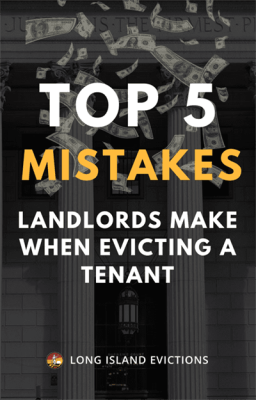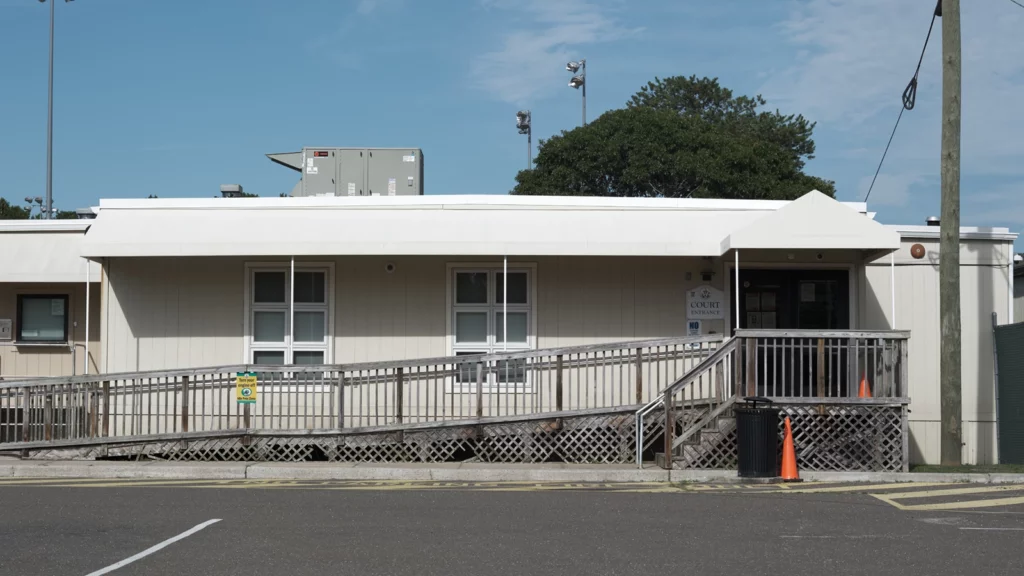Holdover Tenants & Holdover Proceedings
LONG ISLAND, NEW YORK
What Is a Holdover Tenant?
A holdover tenant is a tenant who stays in an apartment past the end of their lease (holding over). The landlord can continue to accept rent payments as a month-to-month tenancy or evict the tenant for “holding over,” even if the tenant is paying their rent on time.
The Holdover Proceeding
A holdover proceeding is a type of eviction proceeding in New York that allows a landlord to evict their tenant. It allows a landlord to recover possession of the property from a tenant or licensee based on reasons OTHER than the failure to pay rent.
Holdover proceedings are used to evict both holdover tenants and licensees (someone you allowed to stay but now refuse to leave).
Examples of situations where a holdover proceeding should be used instead of a nonpayment proceeding include a tenant whose lease has expired or terminated and who refuses to leave; a licensee who was never a rent-paying tenant but who overstayed his welcome; a squatter; a person whose possession is incident to employment, etc.
Types of Holdover Tenants
Several different types of occupancies may lead to a holdover eviction. For example, if the occupancy is
- A tenancy at will or by sufferance;
- A month-to-month holdover tenant because the original lease agreement for a term has expired and the tenant remains in possession of the apartment with or without your permission (lease holdover);
- An occupancy incident to employment;
- A licensee who was never a tenant and had no exclusive possession of any part of the property;
- An intruder and squatter;
- Property purchased after foreclosure, and the person you want to remove is the former owner or tenant.
These occupancy types above are just some examples of occupancies requiring a holdover proceeding to evict a tenant-licensee rather than a nonpayment proceeding.
Resources for Evicting a Holdover Tenant:
Evicting Violent Tenants or Disruptive Tenants with a Holdover Proceeding
In addition, if your tenant has a valid lease or a month-to-month lease that he is timely paying, but he is threatening other tenants or otherwise violating the terms of their lease, then a holdover proceeding is most likely your best legal remedy to evict the violent tenant from your apartment.
When Would You File a Nonpayment Proceeding Instead of a Holdover Proceeding?
A core requirement of filing a nonpayment proceeding is that the tenant stopped paying the rent. If you’re in a situation where your tenant held over past the expiration of their lease term and stopped paying monthly rent, you can bring either type of proceeding.
So why would you bring one over the other? The negative to filing a holdover proceeding as opposed to a nonpayment eviction proceeding is that a holdover proceeding takes a bit longer than a nonpayment proceeding to evict your tenant.
And the negative of filing a nonpayment proceeding instead of a holdover proceeding is that the tenant can show up and pay the rent arrears in full. Payment of rent would cause the dismissal of your nonpayment action. So if you want the tenant to leave no matter what, a holdover proceeding may be your best choice.
If you’re in a position where your holdover tenant also stopped paying the rent, it can be a difficult decision to understand which proceeding would be best. So please call us for some legal advice or a free consultation, or learn more about nonpayment proceedings and the relevant timelines on our nonpayment page.
Read FAQs from both
Landlords and Tenants
And view our answers to their questions.
TYPES OF
EVICTION EVICTIONS:
FIND YOUR LOCAL
EVICTION COURT:
RELATED ARTICLES:
What’s the Penalty for Renting an Illegal Apartment?
Renting an illegal apartment can lead to serious consequences, but it may...
Read MoreHow Long Does it Take to Evict a Tenant in Nassau County or Suffolk County, NY?
The Evictions Timeframe Varies Depending on on Several Factors There is no...
Read MoreSquatters rights in New York: The Definitive Guide to Getting Them Out
Squatters rights in New York: The Definitive Guide to Getting Them Out...
Read MoreHow Long Does it Take to Evict a Holdover Tenant?
Unfortunately, the timeframe varies a great deal. Depending on the occupancy type as discussed above, you must serve your holdover tenant with predicate notices before filing a holdover proceeding. These predicate notices can range in time from a 10-day notice to a 90-day notice, depending on the type of eviction proceeding and the amount of time the person has been living in the residence.
For example, eviction of a squatter requires a 10 day notice. Whereas the eviction of a former tenant who has been residing at the property for two years or more requires a 90 day notice.
You must then wait out the notice period (up to 90 days) before filing your holdover eviction petition in district court.
Once you have your court date, Suffolk County District Courts usually take 30-45 days to resolve an eviction; the Nassau County District Court usually takes 45-60 days; and the Town Justice Courts on the East End usually take about 30 days. Then add at least two weeks to that total for unforeseen issues.
Timeframes may vary depending on circumstances, and most evictions will be resolved in less time than that. However, knowing the maximum time will place the landlord in a better position to make plans for the property.
The Eviction Process for a Holdover Tenant in Nassau and Suffolk County
Before you evict a holdover tenant, there are certain things you must know. First, you must be properly situated to bring the action. That means, generally, that you must be the property owner, and the holdover tenant must still be in possession of the property. There must also be no written lease agreement in effect.
Serving the Prerequisite Notice on Your Holdover Tenant
Usually, a predicate notice is required to give notice to terminate the holdover tenancy before you can initiate a holdover proceeding in court. This means that before you can bring a court proceeding to evict your holdover tenant, some form of notice must be served on your holdover tenant by a non-party. And by non-party, I mean that you, as the landlord, cannot serve the notice on your tenant yourself. A process server or a non-party must serve it. The type and length of the notice depend on many factors, including the lease period and the occupancy type. It can range from 10 days to 90 days, depending on the circumstances.
Filing the Holdover Petition
Upon the conclusion of the term stated on the prerequisite notice, your holdover tenant will hopefully have moved out. If not, you may now file a holdover proceeding in district court to evict your holdover tenant.
The venue that you file in depends on where the property is located. You can visit our Long Island Courts page to find the courthouse you would need to evict your holdover tenant.
Once your petition is filed, your petition and additional legal notices must be served on the holdover tenant in a particular manner within a particular timeframe. Any mistakes will lead to the dismissal of your case.

View Our Long Island Courts Page
View every court in Nassau County and Suffolk County by town, and find out where your landlord tenant court is located.
Executing Your Holdover Warrant of Eviction
At the conclusion of your holdover proceeding, you should be issued a warrant of eviction. The sheriff’s department executes the holdover warrant and physically removes your holdover tenant from the premises.
Call or Text
Have Questions? Speak with Us For Free.
We offer free consultations via phone, text or chat. Don't wonder about what your rights are or what your next move is. Call and find out.
📞 (631) 888-6989💬 Text Us Now"How do I Find the Best Landlord Tenant Attorney
to File My Holdover Eviction Proceeding?"
It’s not hard to find the best Long Island landlord tenant attorney. You just have to ask the right questions, and make a personal choice.
Speak with them and ask lots of questions, read the reviews, and ensure they have the experience to get you the desired result.
- ⚖️ Make sure the landlord tenant lawyer primarily focuses on landlord tenant law.
- 🕵️ Ask them how many evictions proceedings they've done, and how much experience they have.
- 💰 Understand not only the fees, but any additional (hidden) charges.
- Get the free guide

Is this you?
want our free guide?
Subscribe to our newsletter & make sure you’re not making the same mistakes.




